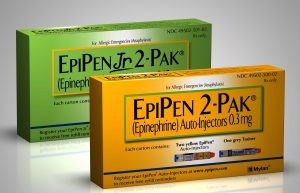 Drugmaker Mylan NV has expanded a recall of EpiPen devices in the United States and other markets. Meridian Medical Technologies, Mylan’s manufacturing partner, has issued a voluntary recall for 13 lots of the EpiPen and EpiPen Jr. Auto-Injectors distributed in the U.S. Mylan originally recalled more than 81,000 EpiPens in Europe, Australia, New Zealand and Japan in late March.
Drugmaker Mylan NV has expanded a recall of EpiPen devices in the United States and other markets. Meridian Medical Technologies, Mylan’s manufacturing partner, has issued a voluntary recall for 13 lots of the EpiPen and EpiPen Jr. Auto-Injectors distributed in the U.S. Mylan originally recalled more than 81,000 EpiPens in Europe, Australia, New Zealand and Japan in late March.
The company has received two reports of devices failing to activate in emergencies, sparking the recall. A device failure could be life-threatening. The shots are essential for people with a severe acute allergic reaction to foods, medicines or insect stings. Allergic reactions account for about 200,000 emergency room visits per year, roughly one every three minutes.
The market for epinephrine auto-injectors is quite large. In 2015, an estimated 3.6 million people in the U.S. were prescribed an EpiPen. Sales of prescription epinephrine products totaled approximately $1.2 billion that year. Up to 15 million people have food allergies in the U.S., according to Food Allergy Research & Education. Families need the product at home and most schools require that students who need the devices have at least two EpiPens held in the nurse’s station.
Mylan is currently the focus of multiple federal investigations due to its moves with the EpiPen. Mylan purchased the product in 2007, then raised the price by about 600 percent to more than $600 per injection, incurring justifiable outrage from the public and government officials. Mylan CEO Heather Bresch was forced to testify before Congress about her company’s pricing.
Mylan has also been criticized for classifying EpiPen as a generic instead of a branded product to provide much smaller rebates to state Medicaid programs. Mylan recently came out with its own generic version of the EpiPen to quell the controversy, but priced at $300, the cost is still far higher than the original price of $57. Mylan won’t say if it will begin paying a higher Medicaid rebate for EpiPen soon.
There are potential competitors to Mylan in the auto-injector market. Kaleo has relaunched a similar auto-injector called the Auvi-Q. Impax Pharmaceuticals has another version, called Adrenaclick. Adamis Pharmaceuticals Corporation has one pending FDA review and Teva hopes to release a generic EpiPen later this year. However, the injectors operate differently and there are dosing differences so pharmacies cannot automatically substitute one for another.
